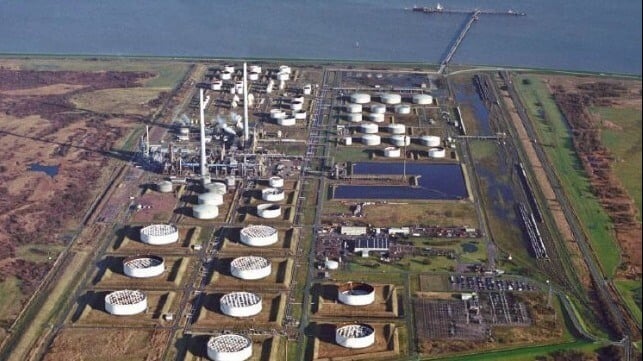Study Explores Developing CO2 Transport Hub from Wilhelmshaven

Efforts are continuing to transform Germany’s Wilhelmshaven port into a future alternative energy hub. In addition to the current construction of an import LNG terminal and long-term plans for ammonia and alternative fuels, a new project will focus on the development of a CO2 hub. Oil and gas company Wintershall Dea and HES Wilhelmshaven Tank Terminal have signed a Memorandum of Understanding to jointly develop CO2nnectNow, a CO2 hub at the existing HES Wilhelmshaven Tank Terminal.
The HES Wilhelmshaven Tank Terminal, which is owned by Netherlands-headquartered HES International, was selected as the site for CO2 storage and transport due to its strategic location, deep draft quay, and extensive industrial and rail infrastructure. The terminal, which is Germany’s largest independent liquid bulk terminal, has a 1.3 million cbm capacity for a wide range of liquid bulk products.
The companies have launched a study to determine the feasibility of employing a portion of the tank terminal for use in the storage and transport of CO2. They expect to complete the initial study in 2023.
The plan calls for the transport of CO2 from German industrial locations that can not eliminate CO2 from their processes. From there, the CO2 would first be shipped, later transported via pipeline, from the deep-water port to geological formations in the Norwegian and Danish North Sea to be stored. Starting in 2028, the companies project that more than 10 million tons of CO2 could be exported annually from Wilhelmshaven to offshore deposits.

that matters most
Get the latest maritime news delivered to your inbox daily.
“At HES International, we are pursuing sustainable growth, with a strong focus on opportunities in the energy transition such as hydrogen, CO2, and clean fuels. Our Wilhelmshaven Tank Terminal has an ambition to play a central role in Northern Germany’s energy transition. The terminal is very well positioned to do so, with ample land available for development, and extensive jetty and rail capacity,” said Martijn Fock, Business Development and Commercial Director at HES International.
Wintershall Dea presented a plan in May 2022 to produce large quantities of hydrogen from natural gas in Wilhelmshaven. The company is participating in the CO2nnectNow project expecting that the CO2 generated by its BlueHyNow would be captured and collected at the terminal. Long-term, the company looks to replace the shipment of CO2 with a recently announced partnership with Equinor aiming to connect Germany and Norway with a pipeline stretching more than 550 miles. The pipeline is estimated to have an annual capacity of up to 40 million tons by 2032 and will enable the transportation of CO2 from the German coast to the Norwegian North Sea.
